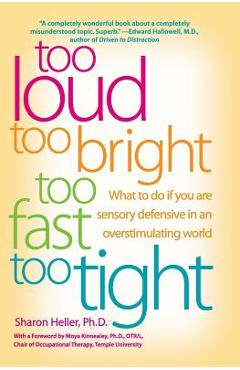Too Loud, Too Bright, Too Fast, Too Tight: What to Do If You Are Sensory Defensive in an Overstimulating World - Sharon Heller

Detalii Too Loud, Too Bright, Too
libris.ro
117.18 Lei
130.2 Lei
Self-help
Sharon Heller
Too Loud, Too Bright, Too - Disponibil la libris.ro
Pe YEO găsești Too Loud, Too Bright, Too de la Sharon Heller, în categoria Self-help.
Indiferent de nevoile tale, Too Loud, Too Bright, Too Fast, Too Tight: What to Do If You Are Sensory Defensive in an Overstimulating World - Sharon Heller din categoria Self-help îți poate aduce un echilibru perfect între calitate și preț, cu avantaje practice și moderne.
Preț: 117.18 Lei
Caracteristicile produsului Too Loud, Too Bright, Too
Comandă Too Loud, Too Bright, Too Online, Simplu și Rapid
Prin intermediul platformei YEO, poți comanda Too Loud, Too Bright, Too de la libris.ro rapid și în siguranță. Bucură-te de o experiență de cumpărături online optimizată și descoperă cele mai bune oferte actualizate constant.
Descriere magazin:
With empathy, compassion, and practical tools, a developmental psychologist and sufferer of Sensory Defensive Disorder (SD) sheds light on a little known but common affliction in which sufferers react to harmless stimuli as irritating, distracting, or dangerous We all know what it feels like to be irritated by loud music, accosted by lights that are too bright, or overwhelmed by a world that moves too quickly. But millions of people suffer from Sensory Defensive Disorder (SD), a common affliction in which people react to harmless stimuli not just as a distracting hindrance, but a potentially dangerous threat. Sharon Heller, Ph.D. is not only a trained psychologist, she is sensory defensive herself. Bringing both personal and professional perspectives, Dr. Heller is the ideal person to tell the world about this problem that will only increase as technology and processed environments take over our lives. In addition to heightening public awareness of this prevalent issue, Dr. Heller provides tools and therapies for alleviating and, in some cases, even eliminating defensiveness altogether. Until now, the treatment for sensory defensiveness has been successfully implemented in Learning Disabled children in whom defensiveness tends to be extreme. However, the disorder has generally been unidentified in adults who think they are either overstimulated, stressed, weird, or crazy. These sensory defensive sufferers live out their lives stressed and unhappy, never knowing why or what they can do about it. Now, with Too Loud, Too Bright, Too Fast, Too Tight , they have a compassionate spokesperson and a solution-oriented book of advice.

Produse asemănătoare

Sensitive: The Hidden Power of the Highly Sensitive Person in a Loud, Fast, Too-Much World - Jenn Granneman
![]() libris.ro
libris.ro
Actualizat in 28/10/2025
177.42 Lei

NYX Professional Makeup Line Loud Vegan creion contur buze cu efect matifiant culoare 33 - Too Blessed 1,2 g
![]() notino.ro
notino.ro
Actualizat in 28/10/2025
40 Lei

Too Loud, Too Bright, Too Fast, Too Tight: What to Do If You Are Sensory Defensive in an Overstimulating World - Sharon Heller
![]() libris.ro
libris.ro
Actualizat in 28/10/2025
117.18 Lei

When things get too loud: A story about sensory overload - Anne Alcott
![]() libris.ro
libris.ro
Actualizat in 28/10/2025
141.27 Lei

Too Young, Too Loud, Too Different. Poems from Malika\'s Poetry Kitchen, Paperback/Malika\'s Poetry Kitchen
![]() elefant.ro
elefant.ro
Actualizat in 26/10/2025
93.99 Lei
Produse marca Sharon Heller

Too Loud, Too Bright, Too Fast, Too Tight: What to Do If You Are Sensory Defensive in an Overstimulating World - Sharon Heller
![]() libris.ro
libris.ro
Actualizat in 28/10/2025
117.18 Lei
